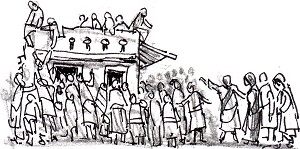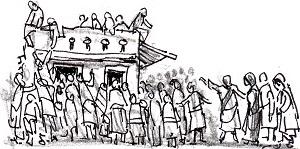

Micah 7:14-15, 18-20; Matt 12:46-50
“Whoever does the will of my heavenly Father is my brother and sister and mother” (Matt 12:50).
What is it that unites a diverse group of people? What is the basis for shared identity and purpose? One answer is that they have shared some common experience so intense or significant that it forms them as one. Even if they have different pasts or former loyalties, these claims give way to a new understanding of who they are together.
The slaves of Egypt had their origin in the great famine that had brought them to the Nile Delta centuries earlier. Egypt was the breadbasket of the Mediterranean, and the threat of starvation must have drawn many foreigners there, where they survived by becoming the work force of the pharaohs, building their cities, ports and monuments. Among these were the Hebrews, separate tribal groups with a common ancestry traced to the patriarch Jacob.
The Book of Exodus makes their escape from Egypt, perhaps during a larger slave revolt, into a founding story and sacred source of a common identity as the Chosen People of Yahweh, a deity more powerful than the gods of Egypt. Liberated into the Sinai desert, the tribes took 40 years, a full generation, to learn to become one people under the leadership of Moses. Their sojourn was a survival classroom as they submitted themselves to the Covenant and Commandments that made them a nation from the memory of their Exodus to freedom.
With this background in mind, we can better understand the shocking impact of Jesus’ response to his family when they came to claim him during his ministry.
“Your mother and your brothers are standing outside, asking to speak to you,” someone told Jesus. The jostling crowd and the inner ring of disciples protecting Jesus from the crush of listeners may have passed the word, “His own mother and brothers are here. Make way.”
But instead, Jesus asks, “Who is my mother? Who is my brother?” Matthew then uses a verb to describe a gesture we find in some of Jesus’s most audacious miracles. Jesus “stretched” out his hand toward his disciples. Jesus also stretched out his hand to the leper, to touch the dead daughter of Jairus. Each stretch was an expansion of grace and freedom, declaring a larger reach for God’s Kingdom and the community of love it proclaimed.
With this gesture, Jesus says that his family is anyone who does the will of his Father. Faith now defines us; it is our center of gravity, our first loyalty, more than blood, ethnic or national identity. Jesus’ words are prophetic, for only after his death and resurrection will his followers realize the stretch that has taken place in human nature itself.
In the risen Christ, a new humanity is revealed in which all former loyalties and divisions are erased. Only the plan of God matters, and it now defines the human family as one in love. There is no more Jew or Gentile, male or female, slave or free. The destiny of the human race is now the Beloved Community, and all are welcome.
The Word of God comes to us at a time when the global community is being threatened by divisive popular nationalism. Jesus places us all under a single Creator and the will of his heavenly Father that we be one in love.
Advertisement






